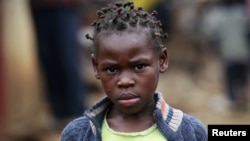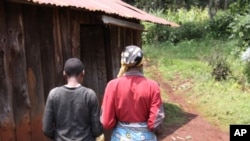NAIROBI —
Officials say violence against children in Kenya is exceedingly and unacceptably high, with the United Nations estimating as many as 10 percent of girls and five percent of boys have experienced at least one episode of sexual violence in the previous 12 months.
The recently-released UNICEF report on violence against children in Kenya says that almost half of the girls who suffered sexual abuse in the year prior to the survey were molested while traveling on foot.
Vulnerability
Madhavi Ashok, the deputy representative of UNICEF Kenya, notes that many of these children are particularly vulnerable in their own communities.
“When you get very comfortable in your environment, and you know that the community is the best place to protect you, girls do get comfortable walking to and from school" Ashok explained. "So the question arises then, that you meet somebody on the way that you will least expect that they would be assaulting you or causing this kind of harm to you, is when that happens. So the girls are themselves totally unsuspecting of what is going to happen to them."
As the executive director of the Gender Violence Recovery Center at the Nairobi Women’s hospital, Wangechi Grace works with victims of sexual violence on a daily basis. She says that UNICEF’s conclusions accurately reflect what she sees at the clinic.
“It’s because children will walk, and they’re playing, and laughing and telling stories as they walk home casually from school," she explained. "And of course, the environment, our roads - our environment is not safe. So perpetrators normally are people who know these children. They’ll watch them, they’ll know their timings. They’ll know how they operate. And they’ll even know how to entice them.”
Unsupervised
Grace says that people in Nairobi lead "fast lives", where parents of all income brackets often leave the home before 6:00 am and return later in the evening, in order to provide for their families. As a result, children are left to their own devices, which she says leaves them more vulnerable to abuse.
“And if you go to the streets, and I’m talking of any street in Nairobi today, and especially at the estates [low income areas]…and stand by any road, you’ll be amazed at the number of children you will find walking alone,” she noted.
And it’s not just happening in Nairobi. Grace says that her team has also carried out assessments of this issue in rural areas of Kenya.
“A lot of communities confirmed that sexual violence was taking place as children and women go to look for water, as they go to look for firewood, as they go to queue for food,” she stated.
Impact
The ramifications for the girl are significant, including social stigma and the risk of pregnancy, HIV, and other sexually transmitted illnesses. It may even mean an end to a girl’s education. UNICEF’s Ashok explains that parents often will remove their daughters from school in an attempt to protect them from harm.
“Definitely the mentality of any parent is that they do not want their child to go through this experience. So as the girl reaches puberty, they do watch the environment and if they feel the community is unsafe or the school is unsafe, they are going to stop the girl from going to school," Ashok explained. "Especially in very, very culturally traditional societies where they have had a culture of protection.”
Solutions
But parents may soon have more options to keep their daughters safe. Ahmed Hussein, the director of children’s services, in the Ministry of Gender, Children, and Social Development, says the Kenyan government contributed to the UNICEF report and is committed to stopping violence against children.
“And as a country, we have already developed the framework for the national child protection system. And we are setting up child protection centers in the counties, to respond to violence and abuse against children. It’s a commitment from the government of Kenya that we are going to implement the recommendations contained in that report. And our minister gave a tacit commitment towards that,” said Hussein.
The head of Nairobi’s Gender Violence Recovery Center says last year 41 percent of their patients were children - underscoring the need for the government to take action as soon as promised.
The recently-released UNICEF report on violence against children in Kenya says that almost half of the girls who suffered sexual abuse in the year prior to the survey were molested while traveling on foot.
Vulnerability
Madhavi Ashok, the deputy representative of UNICEF Kenya, notes that many of these children are particularly vulnerable in their own communities.
“When you get very comfortable in your environment, and you know that the community is the best place to protect you, girls do get comfortable walking to and from school" Ashok explained. "So the question arises then, that you meet somebody on the way that you will least expect that they would be assaulting you or causing this kind of harm to you, is when that happens. So the girls are themselves totally unsuspecting of what is going to happen to them."
As the executive director of the Gender Violence Recovery Center at the Nairobi Women’s hospital, Wangechi Grace works with victims of sexual violence on a daily basis. She says that UNICEF’s conclusions accurately reflect what she sees at the clinic.
“It’s because children will walk, and they’re playing, and laughing and telling stories as they walk home casually from school," she explained. "And of course, the environment, our roads - our environment is not safe. So perpetrators normally are people who know these children. They’ll watch them, they’ll know their timings. They’ll know how they operate. And they’ll even know how to entice them.”
Unsupervised
Grace says that people in Nairobi lead "fast lives", where parents of all income brackets often leave the home before 6:00 am and return later in the evening, in order to provide for their families. As a result, children are left to their own devices, which she says leaves them more vulnerable to abuse.
“And if you go to the streets, and I’m talking of any street in Nairobi today, and especially at the estates [low income areas]…and stand by any road, you’ll be amazed at the number of children you will find walking alone,” she noted.
And it’s not just happening in Nairobi. Grace says that her team has also carried out assessments of this issue in rural areas of Kenya.
“A lot of communities confirmed that sexual violence was taking place as children and women go to look for water, as they go to look for firewood, as they go to queue for food,” she stated.
Impact
The ramifications for the girl are significant, including social stigma and the risk of pregnancy, HIV, and other sexually transmitted illnesses. It may even mean an end to a girl’s education. UNICEF’s Ashok explains that parents often will remove their daughters from school in an attempt to protect them from harm.
“Definitely the mentality of any parent is that they do not want their child to go through this experience. So as the girl reaches puberty, they do watch the environment and if they feel the community is unsafe or the school is unsafe, they are going to stop the girl from going to school," Ashok explained. "Especially in very, very culturally traditional societies where they have had a culture of protection.”
Solutions
But parents may soon have more options to keep their daughters safe. Ahmed Hussein, the director of children’s services, in the Ministry of Gender, Children, and Social Development, says the Kenyan government contributed to the UNICEF report and is committed to stopping violence against children.
“And as a country, we have already developed the framework for the national child protection system. And we are setting up child protection centers in the counties, to respond to violence and abuse against children. It’s a commitment from the government of Kenya that we are going to implement the recommendations contained in that report. And our minister gave a tacit commitment towards that,” said Hussein.
The head of Nairobi’s Gender Violence Recovery Center says last year 41 percent of their patients were children - underscoring the need for the government to take action as soon as promised.





